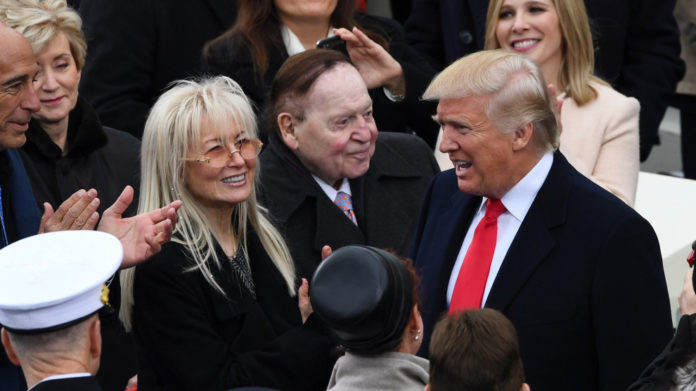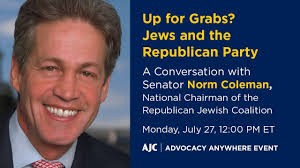
Donald Trump’s tirades are great windows into his deranged mind, but the latest one focused on Jews, and it is especially revealing.
In an interview, Trump said: “There are people in this country that are Jewish that no longer love Israel. I’ll tell you the Evangelical Christians love Israel more than the Jews in this country. It used to be that Israel had absolute power over Congress and today I think it’s the exact opposite, and I think [Barack] Obama and [Joe] Biden did that. And yet, in the election, they still get a lot of votes from Jewish people…which tells you that the Jewish people, and I’ve said this for a long time.
“The Jewish people in the United States either don’t like Israel or don’t care about Israel. I mean, you look at The New York Times, The New York Times hates Israel, hates them, and they’re Jewish people that run The New York Times, I mean the Sulzberger family,” Trump said.
This is ancient news. But because it is from Trump, the sick leader of the Republicans, it should spark a very uncomfortable discussion in the Jewish community, especially among fraternal and charitable Jewish organizations that rely on significant donations to fund their operations.
The issue is why the leaders of the nation’s most prominent Jewish non-profits remain silent about the link between the financial support of the Trump administration by wealthy Jewish donors and the rise in anti-Semitic attacks that occurred during the Trump administration.
 The focus of this discussion should be addressed to the wealthy members of the Republican Jewish Coalition.
The focus of this discussion should be addressed to the wealthy members of the Republican Jewish Coalition.
There are a few reasons for this. First, let’s look at how American Jews view antisemitism and the rise in anti-Semitic attacks. An October 2021 study by the AJC found that 90% of American Jews believe antisemitism is a severe problem, while 40%-50% said it was “somewhat” of a problem. Earlier data from the Anti-Defamation League (ADL) statistics found that there were more antiSemitic attacks in 2019 than in any other year since the ADL began tracking them in 1979. The report noted over 2,100 acts of assault, vandalism, and harassment.
Similar data was also in the FBI’s most recent Hate Crime Statistics Act (HCSA) report, which said 2019 was “the deadliest year on record” with 51 hate crime murders, according to the ADL. This was a 113% increase over the previous record of 24 set in 2018. The FBI found this was the fourth increase in the past five years (ending in 2018), which overlaps with the Trump administration.
But these statistics did not happen in isolation.
Second, let’s follow the money. During this same period, financial contributions by a few very wealthy American Jews were the largest single source of funds to Trump and his Republican Tea Party followers. These donations came from members of the Republican Jewish Coalition (RJC) and its top contributors: Sheldon and Miriam Adelson, Bernie Marcus, Jeffrey Yass, Paul Singer, Steven Schwarzman, and others in the RJC. During the Trump administration, the Adelson’s were Trump’s largest individual contributors, with $75 million in donations.
In practice, this meant that national Jewish groups were fundraising for ways to combat anti-Semitism at the same time that the Republican Jewish Coalition was vastly outspending these same groups to promote a president who was fostering anti-Semitism. Worse, this situation continued for the four years that Trump was president.
Why Are the Top Jewish Leaders Silent?
So, given the links between Trump and white supremacist groups and the RJC, why haven’t many Jewish leaders criticized this deal with the devil? 
Are they avoiding a public discussion about why wealthy Jewish mega-donors would give money to Trump, who has links to white supremacists, at the same time violent acts against Jews are taking place nationwide? Or are these RJC contributions just another demonstration of political free speech that has no accountability?
There are some excellent reasons why the CEOs of top Jewish non-profits are silent. One is that they will offend their largest donors. The second is the change in the structure of Jewish philanthropy over the past few decades. A third is to avoid a national Shanda that could create rifts and damage institutional and personal relationships.
(For more on how Jewish leaders went silent as the RJC financed Trump, see the article on this site, “It’s Reckoning Time for Republican Jews Who Spent Millions Bolstering Trump.“)
Philanthropy is Big Business
Fundraising is a crucial CEO talent for a reason. The same large donors to the RJC are significant donors to national Jewish foundations and charities. Suppose a CEO addresses this link between the Jewish mega-donors and the rise in anti-Semitic attacks. In that case, it will hurt their ability to raise money and endanger their job security and advancement.
In the small, non-profit world, cultivating and fostering personal donor relationships is the key to advancement. As this table shows, being the head of a prominent Jewish organization is very lucrative. According to a December 2017 article in the Jewish Forward, the average salary for the CEO of the top 10 Jewish non-profits is $681,724.
At the everyday operational level, fundraising activities focus on the wealthiest people. There are certainly very charitable middle-class donors, but they are not the main focus of big fundraisers. This makes the whole focus on rich people and their most modern iteration, mega-donors.
The Organizational Change in Jewish Philanthropy
Since arriving in the U.S., Jews have founded and funded charities at the local and national levels. In the late 1800s and early 1900s, Jews founded community organizations that raised money continuously and distributed it immediately to those in need. These organizations included hospitals, orphanages, summer camps, food aid, and immigrant resettlement.
However, in the mid-20th century, upward Jewish mobility and the expansion of federal social programs changed the focus of Jewish philanthropy. Jewish non-profits focused on an expanded menu of long-term plans to remain viable. This altered the funding focus to target large donors and create endowments, creating the new model of “philanthropic perpetuity.”
As Lila Corwin Berman, a professor at Temple University, wrote, “Between the early 1960s and the mid-1970s, nationally, federation endowments grew from $62 million to $223 million.” Changes in tax laws were accompanied by the formation of private foundations focused on Jewish issues.
However, by the mid-1970s, donations from individuals and families began to decline. This was due to changes in the social networking structure, Jewish self-identity, and intermarriage. A 1980 article by Steven Martin Cohen found that “several trends, then, lead to the expectation that today’s younger Jews will emerge as less dedicated donors than their counterparts in the past.” This fundraising void had to be filled. The solution was the mega-donor.
Lousy Chemistry: Mixing Jewish Causes and Political Mega Donors
The mega-donor’s current problem in the RJC, including their blind support of Trump and all of his policies, including attacks on liberal Jewish Democrats, who account for about 78% of all Jewish voters. Still, this does not detract from the good works wealthy donors make to Jewish charitable and philanthropic causes.
But the political will and egos of wealthy people, like the problems associated with big money in politics, tilt the power structure against average citizens.
In the case of the RJC’s pro-Trump financing, the accompanying rise in anti-Semitic attacks was bound to affect ordinary people more than wealthy donors. This is what happened during the increase of anti-Semitic acts during the Trump presidency. 
In many ways, creating a Frankenstein monster like the religious-political group that financed Trump, the Republican Jewish Coalition, was a disgrace to both Jewish values and the democratic political process.
However, the collective egos of the RJCs membership made it impossible to consider alternatives. They needed tax benefits, estate planning credits, special favors, public acclaim, and whatever requests their dark money demanded. And all these happened at the expense of average Americans.
However, if you read the case studies of anti-Semitic attacks during the past four years, you will see that they happened to everyday people going about their business. College students, couples on the way to the synagogue, insults in the classroom, people walking down the street or shopping. The victims of these anti-Semitic slurs or acts were all ordinary people who were hurt by wealthy donors who needed a political favor or were true believers in the Republican Tea Party philosophy.
Political Lobbying Has Nasty Consequences
In many ways, the RJC’s pro-Trump stance was the same as any other corporate lobbying group.
As Robert Reich said when referring to corporate lobbying, “For years, big corporations have been assaulting democracy with big money, drowning out the voices and needs of ordinary Americans and fueling much of the anger and cynicism that opened the door to Trump in the first place.”
The RJC used the same process to drown out the voices and safety requirements of ordinary Jewish Americans. The RJC also cultivated a rabid group of Jewish Republicans who ridiculed Jewish Democrats online as being traitors, wimps, “libtards,” dupes of the liberal media, and worse. Some of these fanatic followers were among the terrorists who attacked the Capitol on January 6. Simultaneously, the RJC never acknowledged the link between Trump, white supremacists, QAnon believers, Christian nationalists, and anti-Semitic groups. This was an intentional omission since they bragged about funding him and supporting his policies for years.
But after the nation witnessed the attack on the Capitol, it was time for the Republican Jewish Coalition to re-examine its purpose. They bet big and lost on Trump and his white supremacist Christian nationalist party. They also must assume some responsibility for the resurgence of anti-Semitism in the U.S.
It also has become clear the RJC has no connection with generally accepted traditional Jewish values and whatever narrow political policies they are advocating daily.
So maybe it’s time for the RJC to admit it is just a club for wealthy Jews who need an ego boost. The record shows that despite spending hundreds of millions on Trump, the RJC backed a sociopath. Worse, in their pursuit of pushing a right-wing political agenda, they are now endangering the physical and mental security of millions of average Jewish Americans.










